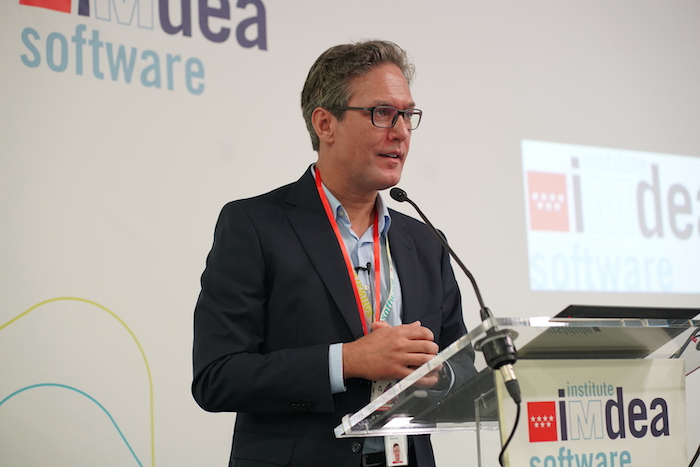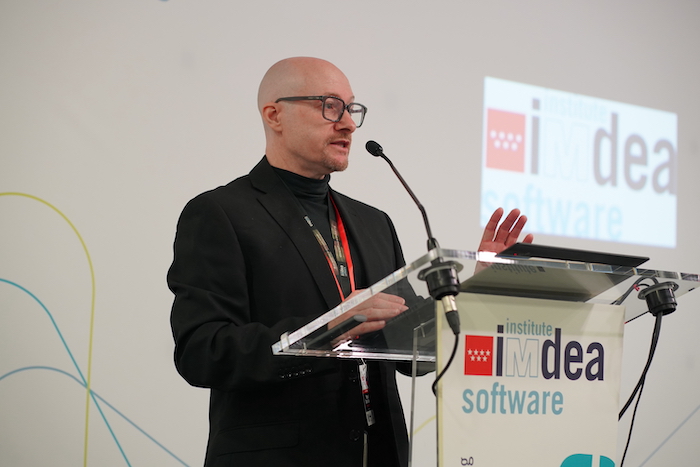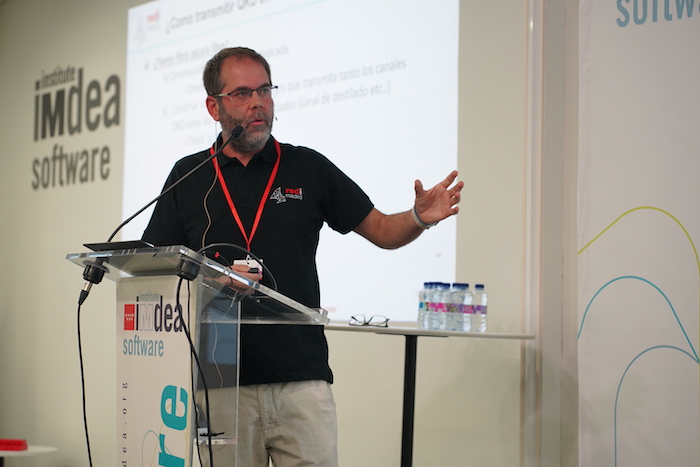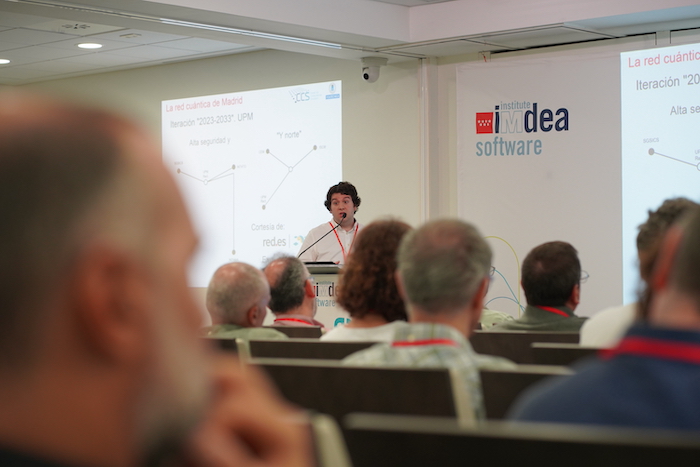The XIX edition of the REDIMadrid Conference took place on Tuesday, October 15, from 9:30 am to 3:30 pm, and on Wednesday, October 16, both at the facilities of IMDEA Software Institute.
More than 80 people attended in person and 25 connected virtually to the first day.

IMDEA Software research professor and director of REDIMadrid, César Sánchez, welcomed the attendees and introduced the personalities who participated in the inauguration. First of all, Bárbara Fernández-Revuelta, Deputy Director General for Research of the Community of Madrid, recalled the importance of this network for the Community of Madrid and the support given to it within the Regional Research Plan.

Manuel Carro, director of IMDEA Software, continued the opening by thanking the attendees and highlighting the importance of networks such as REDIMadrid and their evolution as they face technical and management problems on a daily basis.
After the opening, the technical talks began with the intervention of César Sánchez, director of REDIMadrid, and his presentation: “The state of REDIMadrid: present and future”. In it, he summarized the state of REDIMadrid, which has almost 360,000 users from 16 institutions in the Community of Madrid.
He also mentioned that REDIMadrid has created a new CPD to expand the network to more centers, and that it continues to increase connections to 100 Gbps and build the Madrid quantum network.

Next, David Rincón, the engineer responsible for REDIMadrid, opened the series of presentations on the MadQCI network, a quantum communications ecosystem in the Community of Madrid. He began with a theoretical introduction to quantum communications and explained the problems involved in covering long distances. He also recalled how fast this technology is advancing in development and that research continues on how to amplify or repeat the quantum optical signal.
After Rincón’s speech, Alberto Sebastián, from the Universidad Politécnica de Madrid, discussed the more practical aspects of the MadQCI network, the network from the UPM’s point of view and what they are doing at their university to deploy communication rings between their campuses.

Finally, Vanesa Díaz, CEO of Luxquanta, closed the MadQCI presentations by talking about the introduction of quantum cryptography to protect the confidentiality of networks in metropolitan areas.
After the three presentations, Rincón, Sebastián and Díaz took part in the quantum technologies round table in which they emphasized that quantum technologies are strategic and that the European position is enviable.
After a short break, Aniketh Girish, researcher at IMDEA Networks, showed in his paper “In the Room Where It Happens: Characterizing Local Communication and Threats in Smart Homes” the problems and threats to the privacy of communications within the home, with devices connected together for home automation.
David Navarro and Adolfo Sanz de Diego, from educamadrid, talked about their experiences with WAZUH. David described the main features of this open source cybersecurity platform and explained how they have implemented it in their infrastructure. Adolfo has talked about educamadrid, the educational platform of the Community of Madrid, which provides e-core services, web pages, virtual classrooms… to nearly 2,000 educational centers in the region, with almost 2 million users.
“Strengthening the governance of the data infrastructure” was the presentation given by Lucía Cabanillas, from Telefonica Innovación Digital. Lucía spoke about the exponential increase in the generation of data and its flow through databases and applications, and the importance from the point of view of security and AI, of working to prevent inappropriate access to such data.
The day continued with a presentation by José Alfonso Díaz, from Indra, in which he explained the usefulness of “Open & Disaggregated Network” solutions in MPLS networks, emphasizing disaggregated network systems where software and hardware have separate origins and developments, but have to work together and be compatible.
Finally, José Fidel Tomás, from Juniper Networks, closed this 19th REDIMadrid Conference by trying to answer the question of whether or not WIFI 7 will solve all our problems with communication networks.
The second REDIMadrid Day brought together the network’s partners for a private, technical meeting.